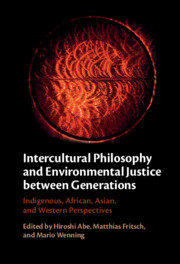 Intercultural Philosophy and Environmental Justice between Generations
Intercultural Philosophy and Environmental Justice between Generations from Part III - Humanity Facing the Near Environmental Future
Published online by Cambridge University Press: 14 March 2024
This chapter explores the philosophical implications of a slowly ending world -- a place where humanity faces unavoidable and imminent (but not immediate) extinction. Section 1 introduces this new thought experiment. Section 2 asks why we should think about unavoidable, imminent, non-immediate human extinction. I argue that my slowly ending world is both an interesting thought experiment and a credible possible future. Sections 3 to 5 explore three topics in detail from the perspective of this slowly ending world: philosophical pessimism, procreative ethics, and multigenerational optimism. The goal of the chapter is not to defend any particular conclusions about the philosophy of the ending world, but simply to motivate its exploration.
To save this book to your Kindle, first ensure [email protected] is added to your Approved Personal Document E-mail List under your Personal Document Settings on the Manage Your Content and Devices page of your Amazon account. Then enter the ‘name’ part of your Kindle email address below. Find out more about saving to your Kindle.
Note you can select to save to either the @free.kindle.com or @kindle.com variations. ‘@free.kindle.com’ emails are free but can only be saved to your device when it is connected to wi-fi. ‘@kindle.com’ emails can be delivered even when you are not connected to wi-fi, but note that service fees apply.
Find out more about the Kindle Personal Document Service.
To save content items to your account, please confirm that you agree to abide by our usage policies. If this is the first time you use this feature, you will be asked to authorise Cambridge Core to connect with your account. Find out more about saving content to Dropbox.
To save content items to your account, please confirm that you agree to abide by our usage policies. If this is the first time you use this feature, you will be asked to authorise Cambridge Core to connect with your account. Find out more about saving content to Google Drive.